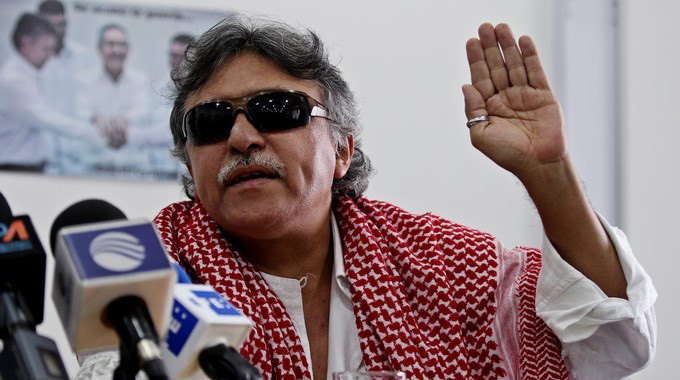BOGOTA, (Reuters) – Colombia yesterday arrested a soon-to-be congressman from the Marxist FARC party on charges of drug trafficking, the government said, sparking outrage from the former rebel group that demobilized last year.
Seusis Hernandez, who was due to take office in July, conspired to export 10 tonnes of cocaine worth $320 million in street value to the United States, Attorney General Nestor Humberto Martinez said in a televised address with President Juan Manuel Santos.
A U.S. grand jury in the Southern District of New York indicted Hernandez, known by his nom de guerre Jesus Santrich, and three others last week, Martinez said.
“The attorney general has informed me that, as the result of rigorous investigation, he has forceful and conclusive proof that show the responsibility of Seusis Hernandez, known as Jesus Santrich, for drug trafficking crimes committed after the accord was signed,” Santos said, referring to the 2016 peace deal between the FARC and the government.
“Those detained have betrayed the values and the principles of the peace deal,” Martinez said.
Hernandez will remain in custody until the U.S. request for extradition is formalized, Martinez said. The Justice Department did not immediately respond to a request for comment.
Under the terms of the deal, FARC has 10 guaranteed congress seats through 2026, one of which the party awarded to Hernandez.
The arrest sparked condemnation by the FARC, which said it was an attack on the peace process. It was unclear whether the party was planing on replacing Hernandez and with whom.
“This is the worst moment the peace process has been through,” the FARC added on Twitter. “The government should act and stop judicial set-ups from leading to events like this, which cause great mistrust.”
Crimes committed by FARC members during the war are set to be adjudicated by a special tribunal, but those committed after demobilization are subject to regular judicial procedure, which includes the possiblity of extradition.
The FARC kept its initials but renamed itself the Revolutionary Alternative Common Force when it became a political party.
The group has repeatedly expressed fear it will be targeted by assassins and persecuted by authorities now it has demobilized. The group says more than 50 party members and relatives have been killed since peace was signed.

